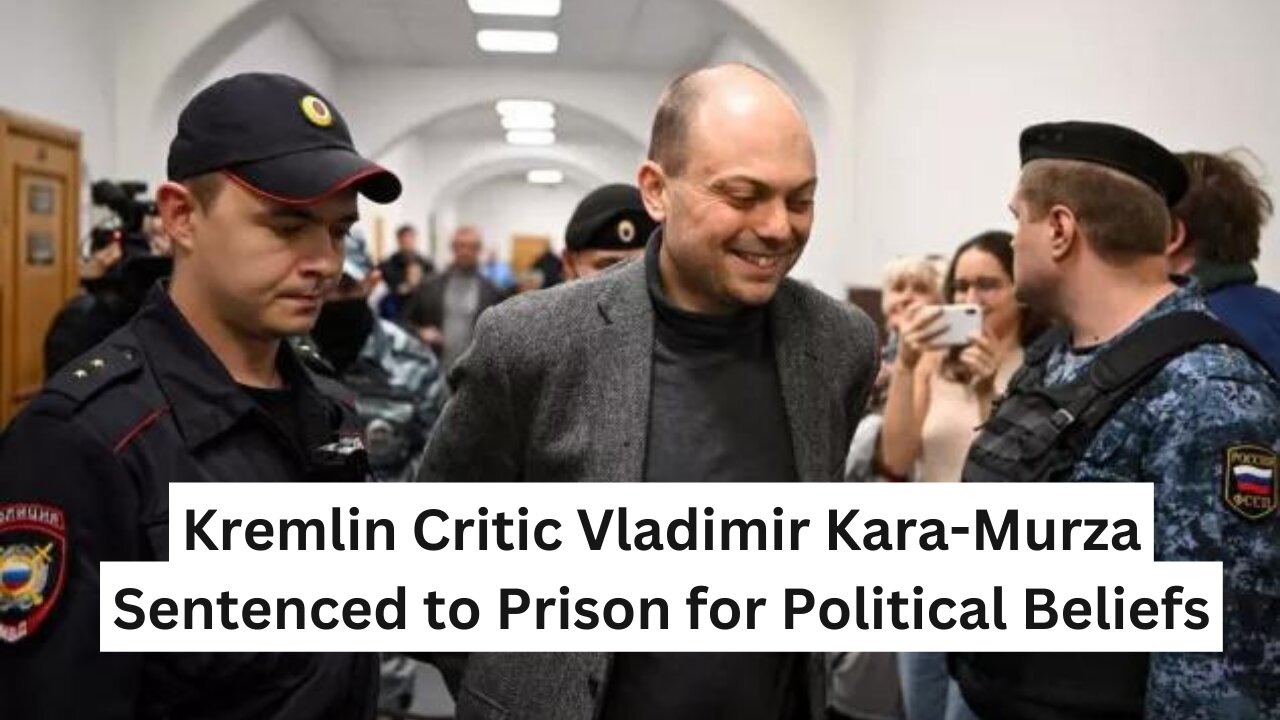Premium Only Content

Kremlin Critic Vladimir Kara-Murza Sentenced to Prison for Political Beliefs
Russian opposition activist Vladimir Kara-Murza has been sentenced to six years in prison, marking a further escalation in the Kremlin’s crackdown on dissent. The charges against him relate to his criticism of President Vladimir Putin’s government and his involvement in championing Western sanctions against Russian officials accused of human rights abuses.
Kara-Murza is a longtime associate of opposition leader Boris Nemtsov, who was assassinated near the Kremlin in 2015. He was also a friend of former US Senator John McCain, who was a vocal critic of Putin and chose Kara-Murza as a pallbearer at his 2018 funeral.
Kara-Murza was instrumental in lobbying for the Magnitsky Act, which enables the US to impose sanctions on Russians accused of human rights violations. The judge in Kara-Murza’s trial, Sergei Podoprigorov, was among those sanctioned under the law, having ordered the arrest of lawyer Sergei Magnitsky in 2008. Kara-Murza’s lawyer twice asked Podoprigorov to recuse himself from the trial, to no avail.
Kara-Murza has survived two poisonings, which he blames on the Kremlin, and Russian officials have denied responsibility. Amnesty International has denounced his sentence as “yet another chilling example of the systematic repression of civil society”, and has declared him a prisoner of conscience.
The sentencing of Kara-Murza has been condemned by Western governments, with the US State Department calling for his immediate release, along with more than 400 other political prisoners in Russia. The UK has summoned the Russian Ambassador over the conviction, while former Arizona state Representative César N. Chávez has called it “appalling and sad to those of us who live in a free society”.
Kara-Murza’s health has reportedly deteriorated in custody, with his lawyers stating that he has developed polyneuropathy in both his feet. According to Kara-Murza’s lawyer, Vadim Prokhorov, he has been handed “in essence, a death sentence”.
The conviction of Kara-Murza is seen as reflecting the authorities’ fear of criticism, and has been described by Memorial, one of Russia’s oldest and most prominent human rights organizations, as “monstrous”. The case has highlighted the difference between Russia and civilized countries, according to Memorial’s head Yan Rachinsky.
The sentencing of Kara-Murza represents a further tightening of restrictions on freedom of speech and dissent in Russia, with the Kremlin cracking down on opposition figures and human rights activists in recent years. The case is a stark reminder of the challenges facing those who speak out against Putin’s regime and the high price they must pay for doing so. As Kara-Murza himself said in his statement to the court: “I know that the day will come when the darkness engulfing our country will dissipate… This day will come as inevitably as spring comes to replace even the frostiest winter.” Subscribe for more content like this.
The recent sentencing of Vladimir Kara-Murza, a Russian opposition activist and former journalist, to three-and-a-half years in prison for alleged extremist activities has sparked global outrage and condemnation. In a statement at the end of his trial, Kara-Murza said he was jailed for "many years of struggle against Putin's dictatorship," his criticism of the war in Ukraine, and his long efforts to champion Western sanctions against Russian officials involved in human rights abuses.
Kara-Murza was an associate of Russian opposition leader and fierce Putin critic Boris Nemtsov, who was assassinated near the Kremlin in 2015. In 2011-12, Kara-Murza and Nemtsov lobbied for the passage of the Magnitsky Act in the U.S., which has enabled Washington to impose sanctions on Russians deemed to be human rights violators. The judge in Kara-Murza's trial, Sergei Podoprigorov, was among those sanctioned after ordering Magnitsky's arrest in 2008.
Kara-Murza had been a friend of Sen. John McCain and was a pallbearer at his 2018 funeral. McCain's choice of the Russian dissident as a pallbearer was widely seen as a slap at then-President Donald Trump, a fellow Republican who was often criticized by the senator for what he saw as having a cozy relationship with Putin. Kara-Murza had worked with McCain on pushing anti-Putin measures through Congress.
The politician and activist survived poisonings in 2015 and 2017 that he blamed on the Kremlin. Russian officials have denied responsibility. Amnesty International denounced Kara-Murza's sentence as "yet another chilling example of the systematic repression of civil society, which has broadened and accelerated under the Kremlin since Russia's invasion of Ukraine last year." The group declared Kara-Murza a prisoner of conscience, convicted for his political beliefs, and demanded his immediate and unconditional release.
Memorial, one of Russia's oldest and most prominent human rights organizations that was named a co-winner of the 2022 Nobel Peace Prize along with human rights defenders from Ukraine and Belarus, also named Kara-Murza as a political prisoner. Memorial's head Yan Rachinsky described the sentence as "monstrous," adding that it reflected the authorities' fear of criticism and "marked a difference between today's Russia and civilized countries."
British and U.S. ambassadors to Russia called for Kara-Murza's immediate release, speaking to reporters on the steps of the Moscow courthouse. Western governments strongly condemned the conviction. "Vladimir Kara-Murza bravely denounced Russia's invasion of Ukraine for what it was — a blatant violation of international law and the U.N. Charter," British Foreign Secretary James Cleverly said in a statement.
The Foreign Office said it summoned Russian Ambassador Andrey Kelin over the conviction. The U.K. previously sanctioned the presiding judge for human rights violations in another case and said it would consider taking further action to hold people accountable in Kara-Murza's case. The U.S. State Department praised Kara-Murza along with jailed opposition leader Alexei Navalny, Yashin, and "many others who serve their country and their fellow citizens at great personal cost by boldly standing up for human rights and fundamental freedoms." It renewed its call for the release of Kara-Murza and more than 400 other political prisoners in Russia.
The U.N. Human Rights Chief Volker Türk called the sentence "another blow to the rule of law and civic space in the Russian Federation.
Conclusion: The sentencing of Vladimir Kara-Murza is yet another example of the Russian government's systematic repression of civil society and its fear of criticism. Kara-Murza was convicted for his political beliefs and his efforts to champion Western sanctions against Russian officials involved in human rights abuses. The international community, including Amnesty International, Memorial, British and U.S. ambassadors to Russia, and the U.N. Human Rights Chief, have condemned the conviction and called for his immediate release. It is imperative that we continue to stand up for human rights and fundamental freedoms, even in the face of adversity. Thanks for watching, subscribe our channel for authenticity.
-
 5:13
5:13
Russell Brand
2 days agoHost GRILLS Pzizer CEO Over Vaccine Efficacy
94K238 -
 14:53
14:53
Stephen Gardner
5 hours ago🔥Alex Jones WARNS Trump not to DEFAULT on THIS!!
33.9K126 -
 31:54
31:54
The Why Files
5 days agoThe Quantum Apocalypse: All Your Secrets Revealed
87.3K59 -
 7:05:17
7:05:17
Sgt Wilky Plays
8 hours agoSaturday Hangout and Games
49.5K4 -
 8:23:23
8:23:23
DeadMan88
9 hours agoWGT Golf Road to Master
30.1K3 -
 1:35:04
1:35:04
Winston Marshall
2 days ago“This Wasn’t Accidental!” Maajid Nawaz SPEAKS OUT on R*PE Gangs and The REAL Cover-Up
108K64 -
 23:46
23:46
barstoolsports
10 hours agoSurviving Barstool Drama Spills Over Into The Office | Stool Scenes
74.9K4 -
 5:11:58
5:11:58
Shield_PR_Gaming
11 hours ago01/18/25. Let's chill with MMORPG and then some shooters!! Read Description! You know you want to!!
51.4K2 -
 1:09:39
1:09:39
Tactical Advisor
10 hours agoTrump Inauguration & New Gun Releases | Vault Room Live Stream 014
47.5K5 -
 11:27
11:27
Adam Does Movies
23 hours ago $6.83 earnedWolf Man Movie Review - Does It Bite?
71.1K13